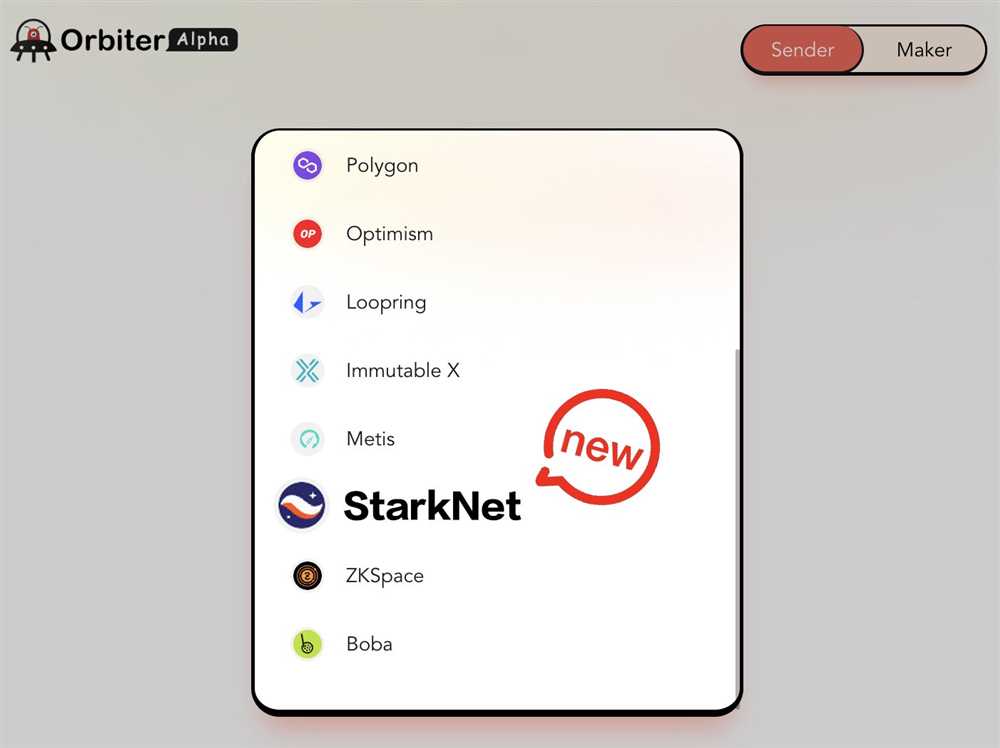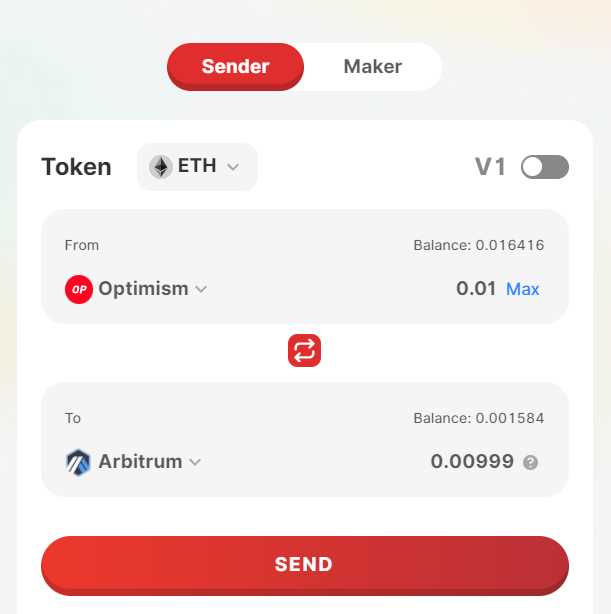
Orbiter Finance vs Traditional Banking – Which Option is Better?

In the world of finance, there has always been a battle between the old and the new. Traditional banking, with its brick and mortar branches and long-standing reputation, has been the go-to option for many years. However, with the rise of technology and the emergence of innovative financial platforms like Orbiter Finance, a new contender has entered the ring.
Orbiter Finance, a decentralized finance (DeFi) platform, offers a fresh approach to financial services. Powered by blockchain technology, it aims to provide users with more control over their assets, transparent transactions, and lower fees. Traditional banking, on the other hand, relies on a centralized system, where banks act as intermediaries between individuals and their funds.
One of the main advantages of Orbiter Finance is its accessibility. Traditional banking often requires individuals to visit a physical branch, fill out paperwork, and wait for approval. With Orbiter Finance, anyone with an internet connection can create an account and start transacting within minutes. This ease of use has made it particularly popular among the younger generation, who value convenience and efficiency.
Orbiter Finance: The Future of Banking

Orbiter Finance has emerged as a disruptor in the banking industry, offering a futuristic alternative to traditional banking methods. With its innovative approach and cutting-edge technologies, Orbiter Finance is revolutionizing the way we manage our finances.
Decentralization: One of the key aspects of Orbiter Finance is its decentralized nature. Unlike traditional banking institutions, which rely on a centralized authority to control and oversee transactions, Orbiter Finance utilizes blockchain technology to create a decentralized network. This not only ensures transparency and security but also eliminates the need for intermediaries, resulting in reduced fees and faster transactions.
Accessibility: Orbiter Finance is breaking down the barriers that have traditionally limited access to banking services. Through its digital platform, anyone with an internet connection can create an account and start managing their finances. This inclusivity is particularly important for underserved populations, who may struggle to access traditional banking services due to various reasons.
Automation: Orbiter Finance leverages automation to streamline financial processes and enhance user experience. Through smart contracts and artificial intelligence, routine tasks such as loan approvals and account management can be executed efficiently and accurately. This not only saves time for both customers and banks but also reduces the risk of human error.
Security: With the increasing prevalence of cyber threats, security is a paramount concern in the banking industry. Orbiter Finance employs advanced encryption and authentication protocols to ensure the protection of user data and transactions. By utilizing blockchain technology, Orbiter Finance eliminates the vulnerability associated with centralized servers and provides a secure environment for users.
Financial Inclusion: Orbiter Finance is committed to promoting financial inclusion by providing services to the unbanked and underbanked populations. Through its blockchain-based platform, individuals who may not have access to traditional banking services can now participate in the global economy, manage their funds, and build financial stability.
Innovation: Orbiter Finance is at the forefront of financial innovation, continually exploring new technologies and solutions to improve the banking experience. From decentralized finance (DeFi) to artificial intelligence and machine learning, Orbiter Finance is driving the evolution of the banking industry and shaping the future of finance.
In conclusion, Orbiter Finance represents a major shift in the banking landscape, offering a future-focused alternative to traditional banking methods. Its decentralized nature, accessibility, automation, security measures, and commitment to financial inclusion make Orbiter Finance a game-changer in the industry. As technology continues to advance, Orbiter Finance is poised to lead the way in shaping the future of banking.
The Benefits of Orbiter Finance
Orbiter Finance offers a range of advantages that set it apart from traditional banking. Here are some key benefits:
1. Decentralization
One of the main advantages of Orbiter Finance is its decentralized nature. Traditional banking relies on a central authority to control and manage financial transactions. With Orbiter Finance, transactions are verified and recorded on a blockchain network, eliminating the need for intermediaries. This decentralized system provides transparency, security, and reduces the risk of fraud.
2. Accessibility

Another benefit of Orbiter Finance is its accessibility. Traditional banking often requires physical presence at a branch or ATM to access and manage finances. However, Orbiter Finance can be accessed from anywhere with an internet connection. This makes it convenient for users, especially those who live in remote areas or have limited access to traditional banking services.
3. Lower Fees

Orbiter Finance typically charges lower fees compared to traditional banking. Traditional banks may have various fees for account maintenance, transactions, and other services. Orbiter Finance, on the other hand, aims to reduce these costs by eliminating intermediaries and utilizing blockchain technology. This can result in significant savings for users and businesses.
4. Greater Financial Control
With Orbiter Finance, users have greater control over their finances. Traditional banking often involves giving control of funds to a centralized authority. However, Orbiter Finance uses smart contracts and decentralized platforms, allowing users to have direct ownership and control over their assets. This provides individuals with the freedom to make financial decisions without relying on intermediaries.
In conclusion, Orbiter Finance offers numerous benefits over traditional banking. Its decentralized nature, accessibility, lower fees, and greater financial control make it an attractive option for individuals and businesses seeking an alternative to traditional banking.
Traditional Banking: A Time-Honored Option
Traditional banking has been a cornerstone of financial services for centuries. It has stood the test of time and remains a reliable option for individuals and businesses alike. With its long history, traditional banking has established itself as a trusted and respected institution in the financial world.
One of the primary advantages of traditional banking is the physical presence it provides. Brick-and-mortar bank branches offer a sense of security and familiarity that online platforms cannot match. Customers have the opportunity to interact with knowledgeable bank staff and receive personalized assistance for their financial needs.
In addition to the personal touch, traditional banking offers a wide range of financial products and services. Whether it’s checking accounts, savings accounts, loans, or investment options, traditional banks have it all. These institutions have built a comprehensive suite of offerings to cater to the diverse needs of their customers.
Another notable benefit of traditional banking is the trust factor. The long-established reputation of traditional banks fosters a sense of security among customers. Deposits are insured by government entities, providing an added layer of protection for account holders. This peace of mind is invaluable in an uncertain financial landscape.
Moreover, traditional banks often provide credit and lending services that are essential for individuals and businesses. They have extensive networks and resources to evaluate creditworthiness and offer financial assistance. This makes traditional banking a vital driver of economic growth and stability.
Despite advancements in technology, traditional banking maintains a strong foothold in the financial industry. It continues to serve as a reliable and time-honored option for those seeking a personal touch, a wide range of services, and a trusted institution to safeguard their finances.
In conclusion, traditional banking is a time-honored option that stands apart from newer alternatives like Orbiter Finance. Its physical presence, comprehensive offerings, reputation for trust, and credit services make it a preferred choice for many individuals and businesses. While newer options may offer convenience and innovation, traditional banking remains a reliable and indispensable pillar of the financial world.
Comparing Orbiter Finance and Traditional Banking
- Accessibility: Traditional banking requires individuals to physically visit a branch to perform transactions or get assistance. In contrast, Orbiter Finance offers a digital platform that allows users to access their accounts 24/7 from anywhere, eliminating the need for in-person visits.
- Transaction Speed: With traditional banking, transactions may take several business days to process, especially for international transfers. Orbiter Finance, on the other hand, leverages blockchain technology to facilitate near-instantaneous transactions, reducing the waiting time significantly.
- Privacy: While traditional banking ensures a certain level of privacy, it often requires sharing personal information with multiple parties throughout various stages of the banking process. Orbiter Finance, being decentralized, allows users to maintain their privacy by eliminating the need for third-party involvement.
- Security: In terms of security, traditional banking systems have well-established security measures, such as encryption and fraud monitoring. Orbiter Finance, being built on blockchain, offers an additional layer of security through transparent and immutable transaction records.
- Cost: Traditional banking may come with various fees, such as maintenance fees, transaction fees, and international transfer fees. In contrast, Orbiter Finance generally offers lower fees due to the elimination of intermediaries and the efficient use of blockchain technology.
Ultimately, the choice between Orbiter Finance and traditional banking depends on individual preferences and requirements. While traditional banking offers familiarity and a physical presence, Orbiter Finance provides convenience, speed, privacy, security, and cost-efficiency. It’s important to evaluate the specific needs and priorities before making a decision.
Making the Right Choice for Your Financial Needs
When it comes to managing your finances, it’s important to choose the right option that meets your needs. Whether you’re considering Orbiter Finance or traditional banking, there are several factors to consider before making a decision.
Determine Your Financial Goals

Before choosing between Orbiter Finance and traditional banking, take the time to determine your financial goals. Consider what you’re looking to achieve with your money. Are you looking to save for the future, invest in stocks, or simply manage your day-to-day expenses? Understanding your financial goals will help you choose the option that best aligns with your needs.
Assess Your Risk Tolerance

Another important factor to consider is your risk tolerance. Orbiter Finance and traditional banking each come with their own level of risk. Orbiter Finance operates in the decentralized world of cryptocurrency, which can be more volatile compared to traditional banking. If you’re comfortable with taking risks and have the knowledge to navigate the crypto space, Orbiter Finance may be a suitable option for you. On the other hand, if you prefer a more stable and regulated environment, traditional banking may be the better choice.
Consider the Convenience and Accessibility
Convenience and accessibility are also key considerations when choosing between Orbiter Finance and traditional banking. Orbiter Finance offers the convenience of decentralized financial services that can be accessed from anywhere with an internet connection. Traditional banking, on the other hand, provides physical branch locations and ATMs for easy access to your funds. Think about your lifestyle and priorities to determine which option suits you best.
Evaluate the Fees and Services
Fees and services offered by Orbiter Finance and traditional banks should also be taken into account. While traditional banks may charge fees for various services, Orbiter Finance operates on the blockchain and may have lower transaction fees. Compare the fees and services offered by both options to see which one provides the most value for your financial needs.
Seek Professional Advice
If you’re still unsure about which option to choose, it’s always a good idea to seek professional advice. A financial advisor can help you assess your needs, explore your options, and make an informed decision based on your unique circumstances.
In conclusion, choosing between Orbiter Finance and traditional banking requires careful consideration of your financial goals, risk tolerance, convenience, fees, and services. By taking the time to understand your needs and seeking professional advice, you can make the right choice for your financial well-being.
Q&A:
What is Orbiter Finance?
Orbiter Finance is a decentralized finance (DeFi) platform that allows users to lend, borrow, and earn interest on cryptocurrencies without the need for a traditional bank.
How does Orbiter Finance differ from traditional banking?
Unlike traditional banking, Orbiter Finance is decentralized and operates on blockchain technology. This means that it does not rely on a central authority, and transactions are recorded on a public ledger. Additionally, Orbiter Finance offers users more control and transparency over their funds.


